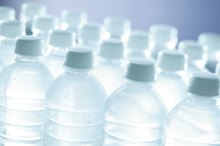Does Drinking Water Lower Cholesterol?
When it comes to making a choice about which beverage to drink, water should always win. Water is calorie-free, fairly inexpensive and offers a number of health benefits, from keeping you cool to helping your body get rid of waste. While hydration is important for accurate cholesterol measurement during a blood draw, water may not have a direct impact on your blood cholesterol. But that doesn't mean it can't help indirectly lower your numbers. Consult your doctor about how to improve your cholesterol.
Fuss About Cholesterol and Triglycerides
Cholesterol is a fatty substance found in your blood and your cells. Your body makes what it needs, but cholesterol levels increase when you eat foods high in saturated and trans fat. Low-density lipoprotein is known as the "bad" cholesterol because it combines with fats and other substances and sticks to your arteries, which leads to narrowing and clogging and increases your risk of having a heart attack or stroke.
High-density lipoprotein is known as the "good" cholesterol because it carries the bad cholesterol away from your arteries and protects against heart attack and stroke.
People who have high cholesterol also tend to have high triglyceride levels, according to the American Heart Association. High triglycerides are often seen in people who are overweight, those with diabetes and people with heart problems.
Importance of Hydration
The Difference Between Nonfasting & Fasting Cholesterol Tests
Learn More
For accuracy, when you get your blood drawn to test your cholesterol levels, you need to fast for nine to 12 hours before the test. The only thing you're allowed to have is water. Dehydration may affect the results of your test. It's recommended that you drink plenty of water before your test to stay hydrated.
On average, adults need 8 to 12 cups of water a day to replace basic losses, according to Clemson Cooperative Extension.
Lifestyle to Lower Cholesterol
You can do a number of things to improve your cholesterol. When it comes to diet, you need to cut back on your intake of foods high in saturated and trans fat, such as whole milk, eggs, fatty meats and butter.
Instead, fill your diet with foods low in these fats such as fruits, vegetables, whole grains, low-fat dairy, seafood, poultry and lean red meat. The American Heart Association also suggests eating more fiber, aiming for 25 grams a day.
Aerobic exercise is recommended as well. The association suggests 30 minutes of moderately intense aerobic exercise, which might include a fast-paced walk five days a week to help improve cholesterol.
Water Might Help
Can I Drink Water Before a Fasting Blood Test?
Learn More
Losing weight and maintaining a healthy weight can also help you improve your bad cholesterol numbers. This is where water might help. A 2008 study published in the journal Obesity found that drinking more water helps promote weight loss and fat loss. Drinking water may indirectly help improve your cholesterol numbers by assisting in your weight-loss efforts.
Related Articles
References
- Centers for Disesae Control and Prevention: Water and Nutrition
- American Heart Association: What Are High Blood Cholesterol and Triglyceride Levels?
- Clinical and Investigative Medicine: Dehydration During Fasting Increases Serum Lipids and Lipoproteins
- Lab Tests Online: Lipid Profile
- Geisinger Medical Laboratories: Preparing for Your Test
- Clemson Cooperative Extension: Fluid Needs
- Obesity: Drinking Water Is Associated With Weight Loss in Overweight Dieting Women Independent of Diet and Activity
Writer Bio
Jill Corleone is a registered dietitian and health coach who has been writing and lecturing on diet and health for more than 15 years. Her work has been featured on the Huffington Post, Diabetes Self-Management and in the book "Noninvasive Mechanical Ventilation," edited by John R. Bach, M.D. Corleone holds a Bachelor of Science in nutrition.









